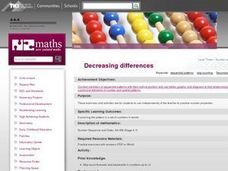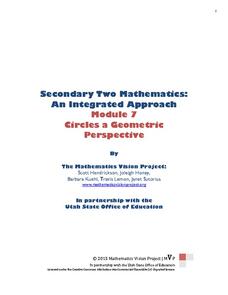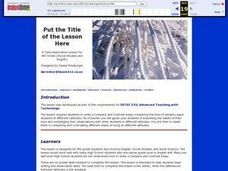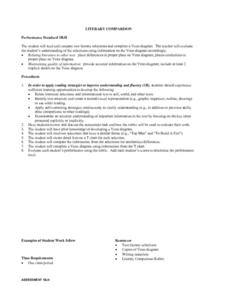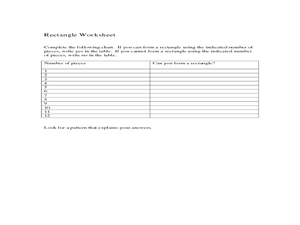Curated OER
Cutting Corners
Second graders examine two-dimensional shapes using their characteristics. In this shapes lesson, 2nd graders identify similarities and differences by using cut out shapes, diagrams, mirrors, and graphic organizers.
Curated OER
Comparing Characters
Students compare similarities/differences of two characters. They demonstrate use of graphing software to compare/contrast their two characters. Students incorporate Inspiration/Kidspiration and the use of a Venn Diagram.
Curated OER
Common Words that are Similar in Polish and English
In this foreign language worksheet, students discover that many Polish words are similar to those in English and the meanings can be guessed. Students read a chart of 220 Polish words and their English translations. Example: balon...
Curated OER
Decreasing Differences
Students identify and interpret the pattern within a set of numbers using words. Then they write rules in words using complete sentences. Students also highlight two similar sequences with the same difference in order to get the first...
Smithsonian Institution
The Soldier’s Experience—Vietnam versus World War I
The Vietnam War and World War I were two very important—and different—wars. To understand the differences, and similarities, class members watch videos, examine primary source documents, and then create a newscast that examines the...
Curated OER
Romantic and 20th Century Period Music
Upper graders explore the similarities, differences, and depth of pop music from the Romantic era and the 20th century. They listen to selections that exemplify the Baroque, Romantic, and 20th century periods, then create presentations...
KenKen Puzzle
KenKen® Puzzle
Think inside the box with KenKen® puzzles to provide some problem solving practice. These puzzles are similar to Sudoku, but require computation inside designated boxes. There are multiple puzzles with a range of difficulties to...
University of Georgia
What's So Special about Bottled Drinking Water?
Is artesian water designed to be better, or is it just from wells similar to those in the city of Artesium? This experiment looks at many different types of bottled waters, including artesian. Using a soap mixture, scholars test to see...
Mathematics Vision Project
Circles: A Geometric Perspective
Circles are the foundation of many geometric concepts and extensions - a point that is thoroughly driven home in this extensive unit. Fundamental properties of circles are investigated (including sector area, angle measure, and...
Curated OER
Spanish-English Cognates in the ELL Classroom: Friends or Foes?
Define the meaning of a cognate and use the concept to help Spanish-speaking ELLs connect their first language to English. Middle schoolers explore Latin roots to find cognates in both languages. They relate the Spanish and English word...
Curated OER
Put the Title of the Lesson Here
Eighth graders write a Compare and Contrast essay comparing the lives of similarly aged students at different Latitudes. They share their essays with epals, via e-mail. They may include digital photographs in their correspondence as well.
Mathematics Vision Project
Module 7: Modeling with Functions
The sky's the limit of what you create when combining functions! The module begins with a review of transformations of parent functions and then moves to combining different function types using addition, subtraction, and...
Curated OER
Understanding and Using Root Words to Expand Vocabulary
Middle schoolers engage in a lesson which reminds them that root words indicate the base meaning of a word, and that those roots are found in many different words that have similar meanings. Pairs of pupils use construction paper and...
Curated OER
Family Traditions, Customs and Beliefs
Students discuss African childhood, explore family traditions, customs, and beliefs, examine African recipes, discuss differences or similarities in food preparation between the U.S. and Africa, and prepare a dish with adult supervision.
Curated OER
Exploring Learned and Innate Behavior
Young scholars explore the differences between learned and innate behavior among humans and monkeys. They complete an assignment and read articles about two studies, which used similar test methods to show that infants and monkeys share...
Curated OER
Literary Comparison
Compare and contrast two pieces of literature with this lesson. With the use of a Venn diagram, pupils make connections between literature and real-life situations. They practice skills of surveying a text looking for important details,...
Curated OER
Area, Perimeter and Rations Using Pentominoes
Learners of all ages investigate area and perimeter through pentominoes. In this geometry lesson, students calculate the are and perimeter of different geometric shapes and describe the properties of similar and congruent shapes. This...
Curated OER
Penguins Around the World
Students investigate penguins. In this Science lesson, students compare and contrast penguins to flying birds. Students use a Venn diagram to illustrate the differences and similarities of penguins and flying birds.
Hawaiʻi State Department of Education
Comparing Themes
The tale of "Lon Po Po" is a Chinese story, very similar to the European tale of "Little Red Riding Hood." Learners make cross cultural comparisons between the two tales, focusing on themes common to both. They review story elements such...
Curated OER
Introduce: Comparison and Contrast
Class discussions can really make concepts come to life. The class discusses the differences between compare and contrast, read a book, then talk about ways they can compare events or characters in the story. Good leading question are...
Center for Learning in Action
Properties of Balls
Enhance your states of matter lessons with a hands-on science investigation that compares six different balls' color, texture, size, weight, ability to bounce, and buoyancy.
Curated OER
The Study of Theme and Figurative Language in Poetry and/or Prose
Identify and analyze the use of figurative language used in select pieces of writing. These pieces of literature will represent at least two pieces by one writer and at least two pieces by different writers. This lesson would be a great...
EngageNY
The Scaling Principle for Area
As they investigate scaling figures and calculate the resulting areas, groups determine the area of similar figures. They continue to investigate the results when the vertical and horizontal scales are not equal.
CPM
How to Recognize the Type of Graph from a Table
Linear, quadratic, and exponential functions are represented only by their table of values in this simple, well-written worksheet. Learners decide the type of graph represented based on the differences in the function values....



